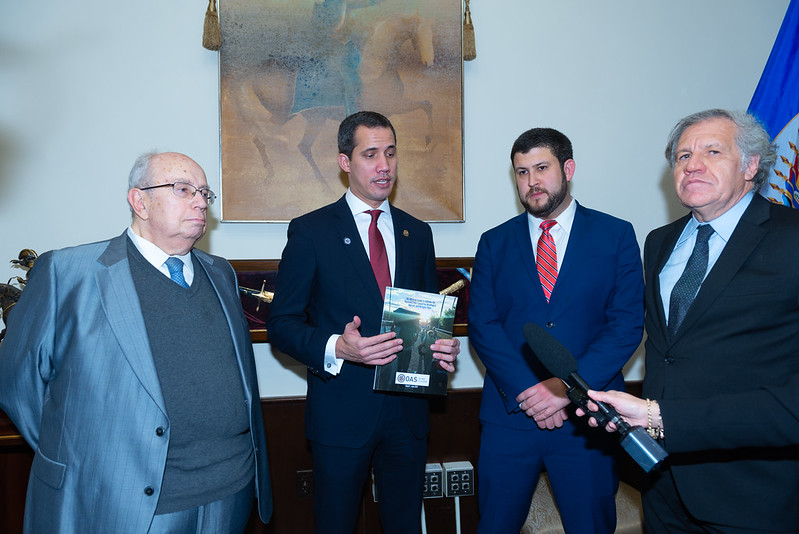
Then Venezuelan Interim President Juan Guaidó with Secretary General of the Organization of American States Luis Almagro during a trip to Washington, D.C.
“A few hours after the fragmented Venezuelan opposition put an end to the figure of the interim government of Juan Guaidó, the Venezuelan president, Nicolás Maduro, launched a diplomatic and political offensive.”
Venezuela’s long struggle against the Maduro dictatorship began 2023 with yet another setback. In 2019, the opposition established an interim government structure to push for a democratic transition in Venezuela, replete with an interim president (Juan Guaidó) who was recognized by nearly 60 countries. That experiment was recently terminated when three of the country’s four main opposition parties voted to dissolve the interim government structure, a move that had been rumored for several months.[i] Since voting to dissolve its own constitutional arrangement, the opposition to Maduro’s regime has fractured.[ii] According to an article from Peruvian media conglomerate Redacción RPP, three of the opposition parties voted to dissolve the structure because it had failed to achieve its objective of a democratic transition away from Maduro’s dictatorship. The article also notes that opacity in the financing and management of international assets had made some opposition legislators uneasy about extending the arrangement. The second excerpted article from Spanish daily La Voz de Galicia reports that the Maduro regime has transitioned to a more offensive posture after several years of being on the back foot, rattled by the opposition’s interim government structure that had been recognized by dozens of countries. Maduro is looking to reassert himself diplomatically and shore up key allies. The Maduro regime’s survival and strengthening serves as a conduit for Chinese, Russian, and Iranian influence in South America and the Caribbean because of their support for Maduro during the regime’s darkest days.[iii] Close security relationships with other authoritarian states mean that Venezuela will continue to represent a hemispheric security threat and an important staging ground for countries like Russia and Iran.
Sources:
“Venezuela: El ‘Gobierno interino’ de Juan Guaidó se extinguió sin claridad en sus cuentas (Venezuela: The ‘interim government’ of Juan Guaidó was extinguished without clarity in its accounts),” Redacción RPP (the largest radio and television broadcasting company in Peru), 10 January 2023. https://rpp.pe/mundo/actualidad/venezuela-el-gobierno-interino-de-juan-guaido-se-extinguio-sin-claridad-en-sus-cuentas-noticia-1459150?ref=rpp
The ‘interim government’ of Juan Guaidó, eliminated… by the majority of the former deputies who supported him in 2019, leaves a shadow in Venezuela due to poor accountability. No one knows how much money he managed or what this sort of parallel power that had the support of foreign powers spent it on… in the next 45 days, Guaidó is obliged to account for the period given to him by the former anti-Chavista deputies who abolished the interim government, considering that the structure did not achieve its objectives, not to mention that they do not know the status of the resources managed under this arrangement.
“Maduro pasa a la ofensiva tras la disolución del Gobierno interino de Guaidó (Maduro goes on the offensive after the dissolution of the interim government of Guaidó),” La Voz de Galicia (a Spanish daily newspaper with good coverage of Latin America), 2 January 2023. https://www.lavozdegalicia.es/noticia/internacional/2023/01/03/maduro-pasa-ofensiva-tras-disolucion-gobierno-interino-guaido/0003_202301G3P18993.htm
A few hours after the fragmented Venezuelan opposition put an end to the figure of the interim government of Juan Guaidó, the Venezuelan president, Nicolás Maduro, launched a diplomatic and political offensive… Maduro also stated in the interview that he awaits the release of the country’s resources frozen in the United States and the United Kingdom.
Notes:
[i] For more information on some of the international legal implications of this decision to dissolve Venezuela’s interim government, see: Ryan C. Berg and Alexandra Winkler, “The Interim Government of Venezuela was Dissolved by its Own Promoters,” CSIS Commentary, 12 January 2023. https://www.csis.org/analysis/interim-government-venezuela-was-dissolved-its-own-promoters
[ii] For information on infighting in the opposition and its impact on the Venezuelan opposition’s standing among voters, see: Luis González Morales, “Knives Out: Venezuelan Opposition Edition,” Caracas Chronicles, 29 December 2022. https://www.caracaschronicles.com/2022/12/29/knives-out-venezuelan-opposition-edition/
[iii] For more information about Venezuela’s deep security relationship with Russia, in particular, see: Vladimir Rouvinski, “Russia’s Continued Engagement with Venezuela in 2019 and Beyond,” Wilson Center, February 2020. https://www.wilsoncenter.org/publication/russias-continuing-engagement-venezuela-2019-and-beyond-update
Image Information:
Image: Then Venezuelan Interim President Juan Guaidó with Secretary General of the Organization of American States Luis Almagro during a trip to Washington, D.C.
Source: https://www.flickr.com/photos/oasoea/49499293397
Attribution: CC BY-NC-ND 2.0
